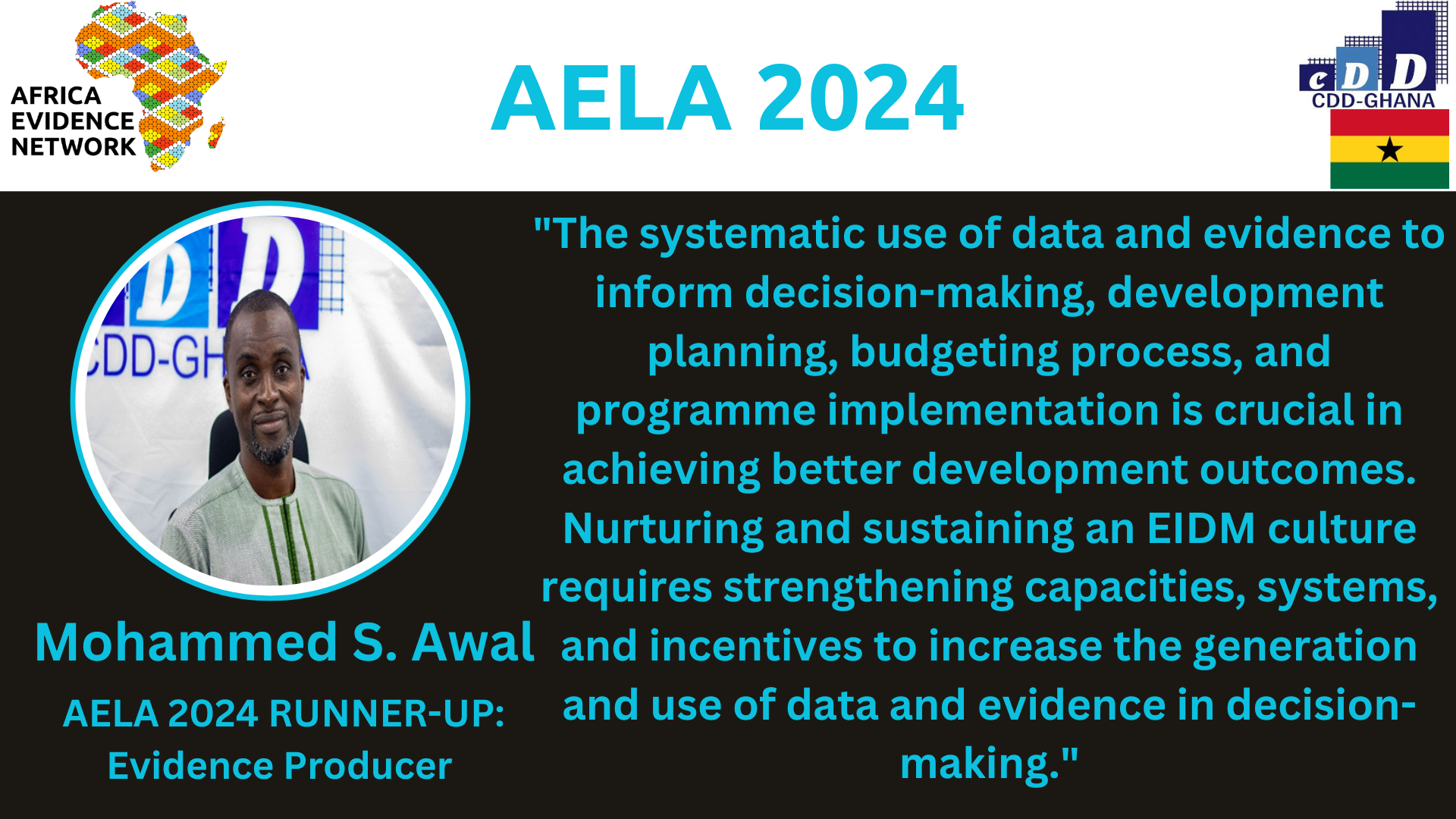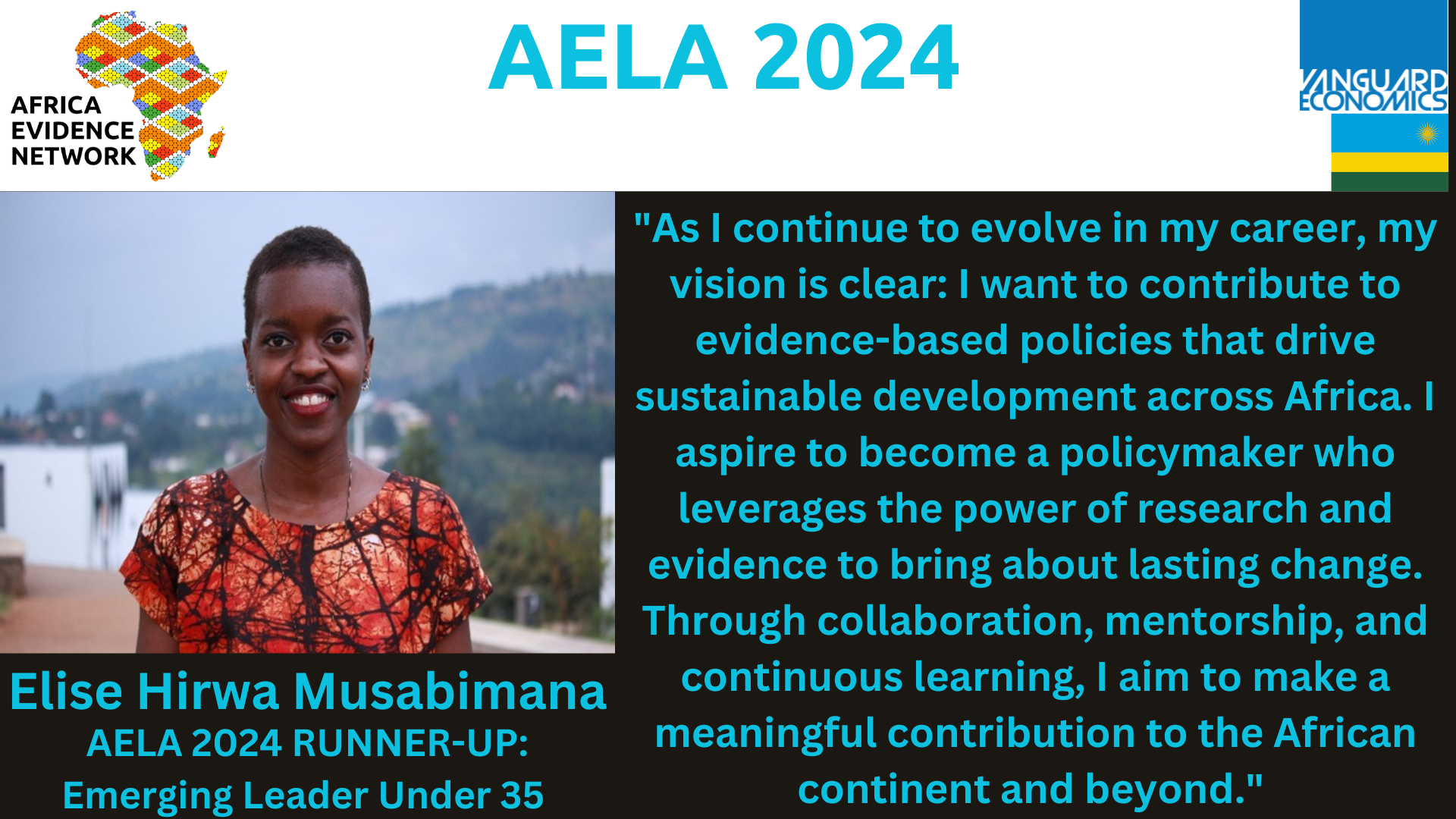
Mohammed S. Awal is a runner-up of the Africa Evidence Leadership Award 2024 in the Evidence Producer category offered by the Africa Evidence Network. We asked Mohammed to reflect on his work.
The systematic use of data and evidence to inform decision-making, development planning, budgeting process, and programme implementation is crucial in achieving better development outcomes. Yet, in many low-income countries’ governments, using data and evidence in policy and practice remains challenging, leading to poor social development outcomes. In Ghana, this challenge is most evident at the district level, where local government authorities have weak capacity, resources, and incentives to generate and use data to inform decision-making on a day-to-day basis.
To address this challenge, in 2019, the Ghana Center for Democratic Development (CDD-Ghana) piloted an ambitious intervention to strengthen evidence-informed decision-making (EIDM) practice in government in three local government authorities in Ghana. Evidence for Development (E4D) intervention aims to enhance local government policy actors’ capacity to use data and evidence to improve local government planning, routine decision-making, and programme implementation and reporting. The goal of the intervention is to institutionalise data and evidence use practice in local government to enhance governance and accountability in service delivery and use of public resources. The E4D project builds on CDD-Ghana’s long-standing mission to bridge research and policy practice to advance accountable governance and inclusive development outcomes. Since 2019, CDD-Ghana has implemented two phases of the E4D intervention.
In this post, I unpack what we have learned from the E4D project in promoting EIDM practice in three local governments in Ghana.
How the E4D project was designed and implemented
CDD-Ghana initiated the Evidence for Development (E4D) project to strengthen and promote evidence-informed decision-making practices in local government – district assemblies - to enhance governance, accountability, and service delivery at the district level. The project is implemented in three districts in Ghana: Bolgatanga East District Assembly, located in the Upper East Region; Dormaa East District Assembly, located in the Bono Region; and Sagnarigu Municipal Assembly, located in the Northern Region.
CDD-Ghana collaborated with national government agencies, local government authorities, and civil society organisations to support a series of initiatives, including training, the set-up of communities of practice, the generation of localised evidence, and public outreach to increase awareness, knowledge, and skills in understanding, producing, finding, communicating and/or using data and evidence to inform policies and decisions.
Key E4D interventions implemented in the districts include capacity development to support local evidence generation and effective use. The training targets stakeholders such as local bureaucratic actors, including chief administrative directors, development planning officers, heads of local health and education agencies, district statistics officers, and civil society advocacy organisations. The interventions are complemented by forming a 'community of practice' (CoPs) that brings together and fosters relationships and dialogue among stakeholders interested in strengthening evidence use practices at the local government level across the three districts. CDD also convened a series of peer-learning platforms between the districts to facilitate cross-district learning.
How the E4D contributed to strengthening EIDM practice in the three districts
The following are the five areas of contribution of the E4D project in promoting EIDM practice at the district level:
1. Strengthened capacity and motivation of diverse evidence-to-policy stakeholders to support EIDM practice in three districts. Through capacity development interventions for key local policy bureaucrats and other evidence ecosystem intermediaries, the E4D project created awareness, improved knowledge, and a renewed appreciation by key stakeholders within and outside government to support and advocate for EIDM practice in the three districts. These actors became very instrumental in the implementation of the project and are now champions of the EIDM approach to policymaking and practice in individual districts and beyond.
Our participation in the CDD-Ghana E4D project CoP meetings and trainings has enriched our discussions at Assembly meetings. Instead of just asking or lobbying for projects as usual, we now present the available evidence on the challenge that needs addressing and why it should be addressed - Assabit Mahmud [Local Councilor, Bolga East District Assembly].
2 Established functional communities of practice in each of the three districts, facilitating dialogue and collaborative actions to address EIDM challenges. The E4D CoPs brought together key local evidence ecosystem actors and provided a whole-of-government and society approach to strengthening EIDM across the three districts. In particular, the CoPs have facilitated the development of local action plans to address the organisational, institutional, and resource constraints to improving EIDM practice (see evidence here, here, and here). They have also undertaken outreach and education to engage communities and citizens to enhance evidence generation and use accountability (see evidence here, here, here, here).
3. Systemic shifts in policy planning practices evidenced in the process quality and improvement in policy and planning documents produced by the district assemblies. The work of CoPs in each district has had the most significant impact in this respect. The CoPs have enabled broad, inclusive participation in policy planning processes, strengthened information sharing, and helped build relationships supporting data and evidence used in the local development planning process. These changes have helped to improve the quality of the recent policy planning preparation process and the district medium-term development policy documents (2022-2025) produced by the district assemblies
"The E4D project has enhanced our capacities and our Annual Action Plans (AAP), and Medium-Term Development Plans (MTDP) preparations are now highly evidence-driven and inclusive.... We are strengthening monitoring and evaluation, and we even plan to decentralise our M&E to the Zonal Council levels to make it more participatory." Mr Toyibu Abdul-Hamid, [Head, Municipal Development Planning Unit, Sagnarigu Municipal Assembly]
4. Nurtured champions who are helping to advocate and promote EIDM at the district level. The E4D intervention has stimulated the interest of particularly civil society actors in supporting the practice of EIDM as a mechanism to improve the quality of governance and government responsiveness for better development outcomes. Most importantly, the local policy bureaucrats and political actors engaged in the project have become key promoters of EIDM in their various departments.
5. Progress towards the long-term goal of institutionalising the use of data and evidence to improve policy and programme implementation at the district level. We have observed a strong commitment by the three districts' local government authorities to generate evidence through programme evaluation. Through the CoPs, they are now allocating resources and collaborating with local civil society partners to co-create evidence by evaluating government priority projects and programmes and using the evidence to support planning and reporting (see here, here, here, here). This collaboration can potentially enhance evidence use to improve accountability and programme implementation strategies.
What we learned and are learning about how to strengthen EIDM practice
Our efforts to find the best ways to support and strengthen data and evidence-use capacity and practices in the three local governments have been a journey of learning, reflection, and adaptation. Here are the five takeaways summarising what we’ve learned and are learning about strengthening evidence use practice:
1. Understanding the local/subnational political economy to identify entry points to support EIDM practice is key. Embedding learnings from a political economy analysis has helped us design approaches responsive to local power dynamics and take advantage of windows of opportunity to promote EIDM practice.
2. The need for a multi-tiered approach to EIDM capacity development that relies on building skills through training and applying those skills is critical. Capacity-building training support should go beyond building general knowledge to include mentoring sessions to support the application of skills gained. This has been found in other contexts to help promote data and evidence use in government
3. Facilitating multi-stakeholder dialogue within and outside government: We have found that facilitating regular engagement and providing opportunities for actors to discuss, share, and collaborate on evidence to policy practice issues improves the awareness and capacity and also has the potential to nurture champions and activists to advance the EIDM practice at the sub-national, district level.
4. We are gaining insight into how working with a change agent - a former local government bureaucrat - with a strong network within the bureaucracy can influence behaviour change and navigate local bureaucratic politics and the power dynamics among actors.
5. The ability of the project team to adapt and iterate project intervention strategies and approaches in response to opportunities and challenges is essential. For example, CDD-Ghana moved away from the original idea of setting up a virtual platform and towards an in-person CoP platform. This adaptation in project implementation resulted in more significant outcomes than would have been achieved if the CoP had been exclusively virtual.
What’s next? Looking forward
Nurturing and sustaining an EIDM culture requires strengthening capacities, systems, and incentives to increase the generation and use of data and evidence in decision-making. In our current and future E4D intervention to support EIDM practice, we are/will continue to focus our efforts on the following initiatives:
- Improve our understanding of the local political economy dynamics to identify entry points to support our partners – the local change agents – to engage with and shape behaviours and actions that will improve evidence-driven decision-making practice in local governments and the evidence-to-policy practice ecosystem at the local level.
- Strengthen capacities, systems, and incentives for local generation and use of evidence by prioritising capacity-strengthening efforts to equip local policy actors with specific skills to analyse and use evidence and data generated through evaluation and stakeholder engagements.
- Strengthen social accountability practice in evidence-to-policy practice by enhancing the capacity for evidence-informed advocacy by media and community-based groups and associations as part of the broader mechanism to promote accountability and support local government use of data and evidence in decision-making on a day-to-day basis
- Continue supporting and promoting – through advocacy, public outreach, and partnership - national and local level government efforts to increase EIDM awareness, capability, and application to support stronger, more responsive, and accountable governance and service delivery.
- Convening multi-stakeholder evidence-to-policy engagement platforms and communities of practice that will support, nudge, and increase accountability in evidence use by local government policy bureaucrats, citizens, and civil society actors across several sectors and policy domains
- Engaging and constantly reflecting on what works, how and why when supporting data and evidence use. This is to help us understand the political economy contexts in which evidence-informed decision-making takes place, including the data and evidence ecosystem and use practice in government
About the author: Mohammed S. Awal is a Research Manager and Team Lead, Governance and Social Accountability Practice at the Ghana Center for Democratic Development (CDD-Ghana) – a research and policy advocacy think tank based in Accra, Ghana. Mohammed has extensive experience designing and implementing evidence-based research, citizen engagement interventions, and accountability and transparency initiatives to support the deepening of democracy and inclusive governance. Mohammed currently leads CDD-Ghana’s Evidence for Development (E4D) project.
Acknowledgement: This blog draws on the work of CDD-Ghana E4D partners across the three districts, who have supported the implementation and coordination of the project activities and reported on the success of the intervention to improve EIDM practice. I also acknowledge the work of Francisca Owusu Sarpong, Research Analyst at CDD-Ghana, who worked with me on the E4D project.
